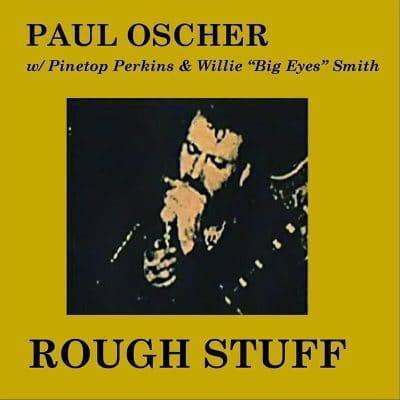Paul Oscher Rough Stuff
Rough Stuff
(with Pinetop Perkins and Willie “Big Eyes” Smith)
Coolstreme
Rough Stuff is a remastered re-issue of multi-instrumentalist Paul Oscher’s 1992 album of the same name. Oscher was a Covid-19 casualty, passing in April of 2021. Readers of these pages are undoubtedly familiar with Oscher, who first joined Muddy Waters’ band as a teenager, primarily playing blues harp. Influenced by both Muddy and Otis Spann, Oscher later mastered piano, guitar and even accordion, which he plays on one track here. As a solo artist he earned multiple Blues Music Awards. This recording, featuring pianist Pinetop Perkins and drummer Willie “Big Eyes” Smith, is obviously a stripped-down affair, containing solo, duet, and only two trio renderings, one without Perkins and Smith but with sax player Willie Bridges and an unknown bassist. Oscher shows the breadth of his command of four different instruments and sings on all tracks. It’s his versatility and the low-down purity of the blues that are the major takeaways.
The album never strays from the old school blues sound as Oscher begins by nodding to his first band leader, Muddy, with “Iodine in My Coffee,” playing guitar and neck harp with Pinetop’s piano accompaniment. The blues chestnut “Wee Baby” has Oscher in the piano chair with Smith on drums before Oscher goes alone with guitar and harp on his original “Debra Lou.” “Cannonball Rock” is an interesting instrumental tune, loosely based on Roy Acuff’s “Wabash Cannonball” and featuring Oscher’s train-sounding harp with the sax and the unknown bassist.
“Downtrack,” another original, features both vocals and spoken word and terrific drumming from Smith as Oscher plays piano. The crowd favorite “Sloppy Drunk” has Oscher solo again on guitar and harp while “Louis Collins” is his solo foray on the accordion, followed by a brief harp only “Liza Jane,” these two showing Oscher’s affinity for country blues. On the fully instrumental “John Henry,” the only one with both Pinetop and Smith, Oscher displays his slide guitar skills.
The train motif reappears with Oscher’s solo guitar/harp interpretation of “B&O Blues,” thumping out an impressive bass line on his guitar while he blows the harp. One of the most lowdown tunes is “Mississippi,” an original featuring Oscher’s slide guitar and Smith’s drumming, paints a harrowing picture of a tough Delta life, which Oscher, originally from Brooklyn, came to understand due his association with blues royalty in Chicago. “Make Me a Pallet,” depicts Oscher’s fingerpicking Mississippi John Hurt-like guitar stylings. Spann’s influence comes most directly on Leroy Carr’s standard “Blues Before Sunrise,” with Smith on drums for this perfect closer.
Oscher followed Little Walter and James Cotton as the harmonicist in Muddy’s great bands, staying there from the mid-sixties through the early seventies. His harp playing influenced a host of players, but his solo career did not receive the attention it deserved. This reissue should compensate somewhat. It’s a shame that too often we don’t recognize the talent until the artist passes.
- Jim Hynes
Buy Us a Cup of Coffee!
Join the movement in supporting Making a Scene, the premier independent resource for both emerging musicians and the dedicated fans who champion them.
We showcase this vibrant community that celebrates the raw talent and creative spirit driving the music industry forward. From insightful articles and in-depth interviews to exclusive content and insider tips, Making a Scene empowers artists to thrive and fans to discover their next favorite sound.
Together, let’s amplify the voices of independent musicians and forge unforgettable connections through the power of music
Make a one-time donation
Make a monthly donation
Make a yearly donation
Buy us a cup of Coffee!
Or enter a custom amount
Your contribution is appreciated.
Your contribution is appreciated.
Your contribution is appreciated.
DonateDonate monthlyDonate yearlyYou can donate directly through Paypal!
Subscribe to Our Newsletter
Discover more from Making A Scene!
Subscribe to get the latest posts sent to your email.















































